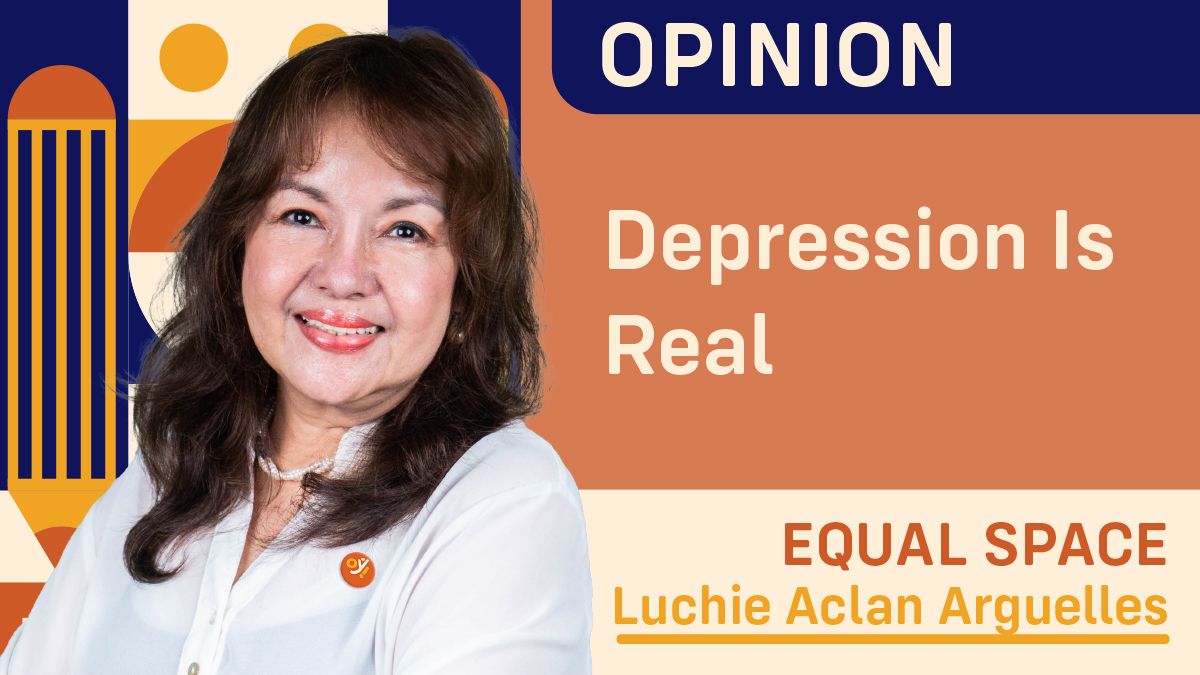It is easier said than to be resolved. I initially thought that depression is just a state of mind and those who are determined and strong-willed will most likely overcome depression.
When one goes through the reality of being in a state of depression, professionals will say that "help is available".
The World Health Organization (WHO) estimates that more than 3.3 million Filipinos are living with depression and this highlights the magnitude of mental health challenge.
Among the youth and young adults, one in every 10 Filipinos experience moderate to severe depression, where females comprise the higher percentage. Indicators redound to domestic problems, being less educated, and the realities of urban life.
To look at the bigger picture, socio-economic issues are among the factors that trigger depression, a major mental health concern in the country.
It is only in recent years that mental health issues, specifically depression, have gained significant attention. In past years, when one consults the "shrink" or psychiatrist or clinical psychologist, this becomes a stigma as one is marked as "with mental illness".
Consulting a professional for problems of the state of mind marks one as "crazy" or as a "coo-coo".
Suicide Rates
Those within the 15-29 age bracket, according to the Philippine Statistics Authority (PSA), are particularly vulnerable to mental health challenges. The youth of today are more sensitive and susceptible to the signs of the times that is why this number has increased by the year.
For instance, in the 2021 PSA figures, suicide rate among young adults was approximately 3.2 per 100,000 population, an increase from 2.5 per 100,000 in previous years. The number has not gone down.
Depression and other mental health conditions have been linked to these rising suicide rates, often exacerbated by social pressures, academic stress, and economic difficulties.
Pandemic Fever
The Covid- 19 pandemic further intensified the mental health crisis in the Philippines. Lockdowns, economic uncertainty, and fear of the virus led to increased levels of anxiety and depression.
During the pandemic, mental health concerns rose by 30 percent during the lockdown period, a survey conducted by the Department of Health, in collaboration with the Philippine Mental Health Association (PMHA) found out. Their helplines and mental health services were overwhelmed by calls from individuals seeking assistance.
Depression, anxiety, and substance use disorders are the most common in these calls. The same survey also found that around 3.6 million Filipinos suffer from depressive disorders, contributing significantly to disability and poor quality of life in the country.
Limited Services
While the government is striving to address mental health issues among its populace, services in relation to these remain limited.
We realize that there is a shortage of mental health professionals, with only around 2.3 mental health workers per 100,000 population.
Mental health services are significantly underfunded, with only about 5 percent of the health budget allocated to mental health. There exists the Philippine Mental Health Act in 2018 that was supposed to address these challenges, aimed at integrating mental health services into the general healthcare system and provide support for mental health programs.
Has the government done enough?
Depression and mental health issues in the Philippines present a growing public health concern. Much work remains to be done, particularly in reducing the stigma around mental health, improving access to care, and providing adequate resources for those in need.
(email opinyon.luchie@gmail.com, luchiearguelles@yahoo.com)
#WeTakeAStand #OpinYon #OpinYonColumn #ColumnbyLuchieAclanArguelles #EqualSpace
